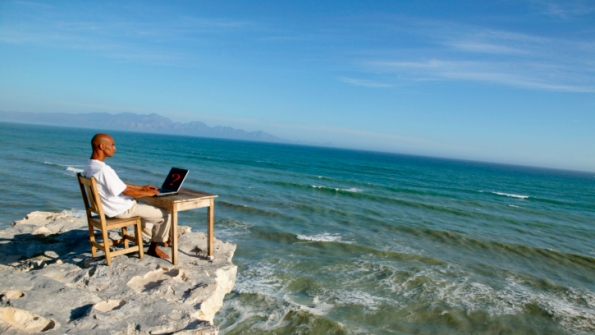 I read the results of a recent U.S. Travel Association-sponsored study with a chagrined sense of familiarity: 41 percent of us ("us" meaning American workers) don't plan to actually take all our vacation time this year, even when we get paid to take it. Yep, I resemble that statistic even though, as is the case with 96 percent of the survey participants, I acknowledge that I really should.
I read the results of a recent U.S. Travel Association-sponsored study with a chagrined sense of familiarity: 41 percent of us ("us" meaning American workers) don't plan to actually take all our vacation time this year, even when we get paid to take it. Yep, I resemble that statistic even though, as is the case with 96 percent of the survey participants, I acknowledge that I really should.
According to the survey results, most of us don't take our full share of paid time off due to fear—of that big old pile on our desks when we get back (40 percent); of not looking dedicated enough to our jobs (28 percent); of not wanting to look replaceable (22 percent) or, conversely, of actually not being replaceable (35 percent won’t use their time off because they believe “nobody else can do the work while I’m away." Oh please.)
And when you’re in the meetings industry, other factors kick in on top of all of this. Like when your job entails constant travel, who wants to climb on another plane for fun? (Well, me, but I know a lot of planners who just want to spend time at their own homes for a change.) And when you’re running 20 or 200 events a year, it’s hard to find a spot on the schedule when there are dire deadlines looming.
And it’s not just worker bees who can’t take a break from the hive every now and then. Even when they do take time off, almost half of the business leader respondents said they answered e-mail, and close to a third returned phone calls, while on vacation. Which of course signals to their employees that it’s not cool to completely get away from work.
Sad, right?
But look at where we’re coming from. The U.S. is the only developed country that doesn’t legally require employers to give us paid vacation time, which sends a big of a message on what we as a culture think about it. And it trickles down to the organization level, with 28 percent of management respondents also saying they had a hard time approving paid-time-off requests, and a third said they rarely or never talk with their staffs about why they should take time off.
But wherever it comes from, this aversion to taking time off is pretty ingrained. And some of us, well, we really love what we do to the extent that, at least some of the time, we’d rather be working than canoeing at the lake. We believe that the satisfaction of a job well done is at least as sweet as an ice cream cone at the beach on Cape Cod, and that what we do in our day jobs is such a big part of who we are that it’s no longer a day job, but just our life. Especially given our 24/7/365 connectivity, work is becoming so enmeshed into everything we do that we never stop, even when we do force ourselves to go “on vacation”—and we may not even want to. Forget work/life balance—what many of us now are dealing with is work/life integration.
But you know, maybe that’s OK. So what if I I do most of my work-related social media nights and weekends, and check work e-mail around the clock. Our non-work life doesn’t stop when we walk into our work space either—we take our lunch breaks to walk the dog (at least, I do); and the kid’s problem at school doesn't disappear from our minds magically and completely until we shut off our computers at night. We’re not two separate people depending on where we are and what we’re doing.
So let’s stop worrying about it and just take that paid time off already, with “off” defined however you want it. If you can put it all out of your mind completely and go all Zen on a beach, more power to you! If you have to clear your work in-box daily to feel relaxed, go for it. I'd say the only hard-and-fast rule has to be that you actually leave the office!
I'm going to try to use all my paid time off this year (I had to just stop myself from typing "if at all possible")—are you?



